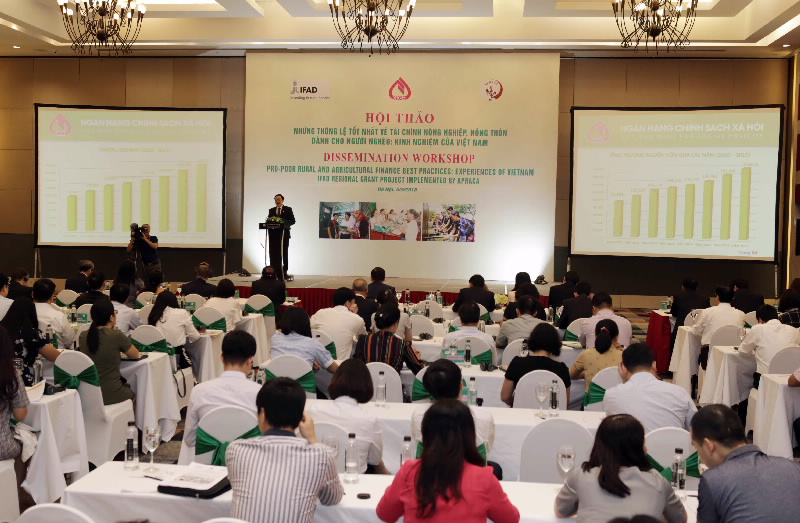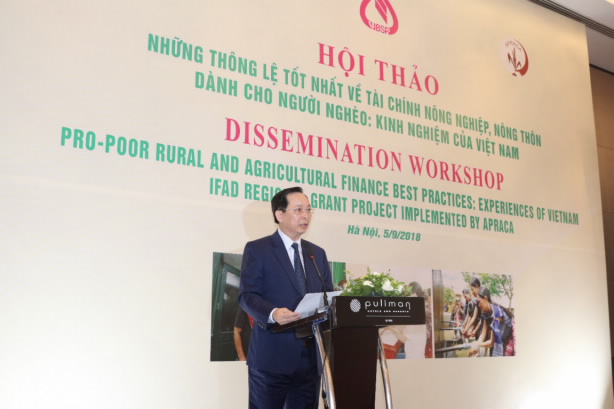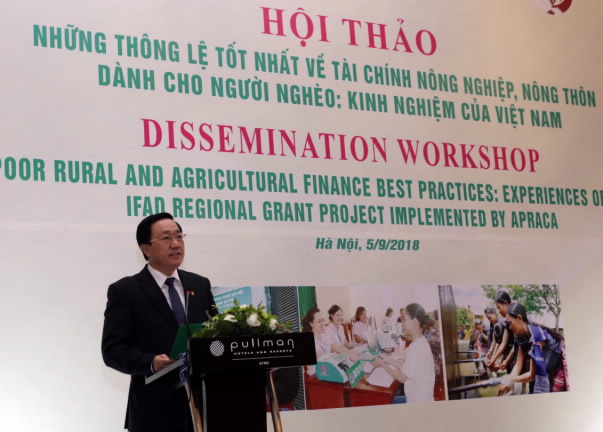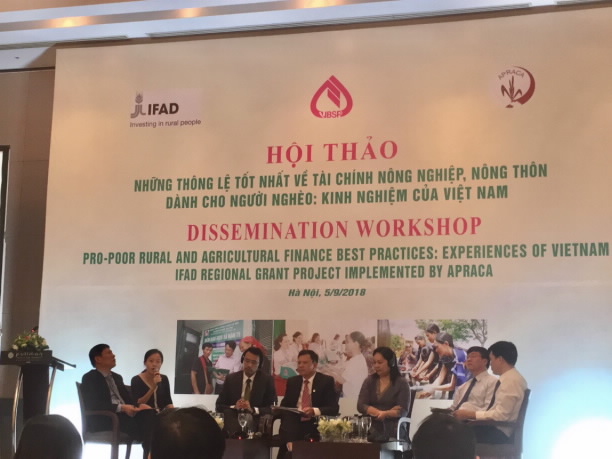Press Release
Dissemination Workshop on “Pro-poor rural and agricultural finance best practices: Experiences of Vietnam”

In the economic development strategy of Vietnam, agriculture is considered the foundation for the development of the whole economy, in which the development of rural financial markets is very important. Rural and agricultural finance is the delivery of financial products including savings or deposits, payments and transfers, credit and insurance; in which, credit activities play a critical role in creating capital for agricultural and rural development.
In his opening remarks, SBV Deputy Governor Dao Minh Tu emphasized that: “For more than 30 years after ‘Doi moi’ policy, the Party, the Government and the whole banking sector have always paid special attention to finance for agriculture and rural areas in Vietnam.” Together with the birth of Resolution 10 on land lease, Vietnam had a policy to provide loans to households, which were managed by Vietnam Bank for Agriculture and Rural Development (Agribank). Under the National target program on poverty reduction, the credit policies for the poor households and other policy beneficiaries are assigned to Vietnam Bank for Social Policies (VBSP). Along with that, preferential credit programs for agriculture and rural areas are directed by the Government and the SBV throughout the whole system of credit institutions (CIs) and on a nationwide scale. Especially, since 2006, the credit programs of the banking sector dedicated to the poor, the agriculture and rural areas have been one of the "pillars" of the poverty reduction policy system in Vietnam. Thus, bank credit flows have contributed significantly to other investment flows of the State, enterprises and people, helping Vietnam achieve the Millennium Development Goal (MDG) on eliminating extreme poverty and hunger in 2002, 13 years ahead of the set-out target; and bringing Vietnam from a low-middle income economy into a middle-income country.

SBV Deputy Governor Dao Minh Tu delivers opening remarks at the Workshop
Reviewing some outstanding results of the banking sector in the areas of agriculture, rural development and pro-poor, Deputy Director Dao Minh Tu mentioned:
Firstly, the system of mechanisms and policies on credit has been constantly innovated and improved in the direction of expanding both the subjects, limits and procedures for lendings in order to meet the demands for investment in agriculture and rural areas, creating jobs, step by step raising the living conditions and making strong, comprehensive changes in the rural, remote and ethnic minority areas. Good financial practices for agriculture and rural areas are being applied and innovated in line with the restructuring of the agriculture sector and new rural development, such as: agricultural value chain loans; loans for hi–tech agricultural applications; loans for organic agriculture, etc.
Secondly, the network of CIs involved in the provision of banking services for agriculture and rural areas has been continuously expanded in terms of size and network of diversified types of activities with 47 banks, 1,181 People's Credit Funds, 27 non-bank credit institutions, 4 microfinance institutions, and jad become an effective channel of capital to every hamlet and village across the country. Modern banking products and services have received much attention for investment and innovation, creating favorable conditions for customers to access with low transaction costs, such as Internet banking, mobile banking ...
Thirdly, the banking sector has concentrated on implementing measures to mobilize financial resources in the society to meet the needs of production and business development, and poverty reduction in agriculture and rural areas on the principle of separation between commercial credits and policy credits.
Fourthly, the banking sector has learnt from the experiences and applied flexibly to the practical conditions in Vietnam with the participation of the whole political system, mass organizations and non-governmental organizations. In particular, the financial practices for the rural areas have been implemented in a creative and effective way, such as: Lending through mass organizations (the Farmers’ Union, the Women's Union, the War Veterans Association,...); community-based ‘borrowers and savers’ groups have been set up to provide community support and cohesion; transaction points at the commune level have been set up; stores for marketing of safeagricultural produce for poor women have been organized;...
As a result, credits for agriculture and rural areas, and for the poor have increased dramatically: Outstanding loans for agriculture and rural areas have increased by an average of 20% per year; policy credits have increased on average by 13% per year, fully, promptly, efficiently and effectively supplying capital for the comprehensive development of agriculture and rural areas.
VBSP is the largest bank in terms of coverage, helping poor households and policy beneficiaries easily access banking and financial services
Further clarifying the importance of rural and agricultural finance for the poor in the economic development, Mr. Duong Quyet Thang, General Director of VBSP said: In Vietnam, VBSP is a Government’s bank established to provide policy credits and other services to the poor and other social policy beneficiaries throughout the country. VBSP is currently the largest bank in terms of coverage in the banking system in Vietnam, ensuring poor households and policy beneficiaries in the rural, mountainous, remote and isolated areas, extremely difficult areas can easily access banking - financial services.

Mr. Duong Quyet Thang, General Director of VBSP speaks at the Workshop
Credit activities of VBSP timely and efficiently meet the demand for loans of the poor and the beneficiaries in the rural areas, contributing to poverty reduction, improving the living standards of farmers, gradually narrowing the income gap between the regions, and stopping usury in the rural areas.
Hence, Vietnam is recognized internationally as a country that has successfully implemented the Millennium Development Goals on sustainable development, poverty reduction and human development. The poverty rate of Vietnam was reduced from the very high 58% in 1993 down to 6.7% in 2017.
Viet Nam has actively participated in the development of agricultural and rural finance to bring about comprehensive development
At the Workshop, Dr. Prasun Kumar Das - Secretary General of APRACA shared: Over the years, Vietnam has been actively involved in the development of rural and agricultural finance to bring about comprehensive development nationwide and has adhered to the principles of the United Nations' Sustainable Development Goals. APRACA has been supporting two Vietnamese banks (VBSP and Agribank) to build up their capabilities to achieve these goals through the exchanges of experiences with other organizations, through visits to learn from the most successful models and staff training. APRACA also supports two member organizations in Vietnam to build the rural institutions in order to provide credits for development and startups. APRACA is committed to supporting all initiatives in Vietnam to improve the credit flows in the agricultural sector to support those weather-dependent communities in the country.
The successful implementation of the Government's policy credit programs in agriculture, rural areas and the poor is indeed a valuable experience that has been reviewed and documented in Vietnam over the years. Through this workshop, Vietnam's banking sector updated the current situation and listened to recommendations from representatives of APRACA and other international organizations. The workshop was divided into two main sessions: (1) Pro-poor rural financial activities and impact on sustainable development in Vietnam; (2) Strategic replication of innovative pro-poor financial products and services in Vietnam.

Delegates exchanges at the Discussion Panel
During the sessions, the delegates, experts, researchers in Vietnam and abroad discussed on the evaluation and recognition of best rural finance practices in line with the socio-economic conditions in Vietnam; experiences of the organizations in APRACA and the assessment of the experiences associated with the specific socio-economic environment of each country, helping to develop the best practices for Vietnam; sharing experiences on specific results on credit’s impact assessment for agriculture and rural areas with particular attention to policy credits as an instrument to solve the problems that thecommercial banks’ credits have not successfully resolved; specific challenges for financial institutions at the national level to develop the appropriate models for each country…
VA
- VBSP promotes green inclusive finance towards sustainable development
- VBSP offers preferential loans to students, master’s students, and doctoral candidates in science, technology, engineering, and mathematics (STEM) fields
- Annual Report 2023
- The VBSP’s Board of Directors (BOD) held its regular meeting for the fourth quarter of 2024
- Annual Report 2022
- VBSP implements tasks for the year 2025
- Credit policies under Decision 22 for ex-prisoners to rebuild lives in Ha Nam
- Households in disadvantaged areas can borrow up to VND 100 million for business and production.
- VBSP's Trade Union worked with the Korean Finance Union delegation
- Promotion of digital financial services to enable financial inclusion for the disadvantaged population in Vietnam
- Outstanding balance grows 5.8 percent in first half: Vietnam Bank for Social Policies
- Policy credit for sustainable livelihoods for ethnic minority people in Gia Lai province
- Vietnam Bank for Social Policies - the largest bank in terms of access points in Vietnam
- Experiences and knowledge exchange on housing finance
- Social housing credit package of VND1 trillion to be launched in 2018
- People with disabilities in need of exclusive source of low-cost loans
- Boosting green credit for sustainable development in Viet Nam
- Nearly 1.5 million ethnic minority households access financial services and products
- Sustainable poverty reduction by microfinance
- Help the poor to access policy credit and financial services

- Policy credit empowers women to rise and stabilize their livelihoods
- VBSP promotes green inclusive finance towards sustainable development
- STEM Credit - Nurturing Dreams of Knowledge
- 2025 Implementation Project Report “Promoting Financial Inclusion in the Development of the Cooperative Economy in the Digital Economy in Vietnam”
- Vietnam Bank for Social Policies and the Journey of Building a Public Financial Institution for the People
- Regulations on the Organization and Operations of Vietnam Bank for Social Policies (VBSP)
- Annual Report 2024
- Synchronizing solutions to ensure safe and effective credit operations
- VBSP'S PROGRESS REPORT IN 2025
- VBSP: Breakthrough in a year full of challenges
LENDING INTEREST RATE
|
||||||||||||||||||||
DEPOSIT INTEREST RATE
|
||||||||||































